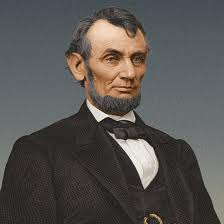By: Daniel Nardini
 The new movie Lincoln, about the efforts by former U.S. President Abraham Lincoln to do whatever it took to save the United States and abolish slavery, will soon hit the theaters. There is no question there might be some controversy about the film. Yes, Lincoln was truly reviled in so many ways during his day, and especially by people in the southern states who tried to form their own country. Lincoln did wage a ruthless war to crush the Confederate States of America, and his generals did wage a scorched earth policy that devastated many southern cities. Lincoln did institute government censorship and he did put people in prison for their sympathies to the Confederate cause. Little of this is revealed in the movie. However, a book entitled Shattering the Icon of Abraham Lincoln does reveal these things and more.
The new movie Lincoln, about the efforts by former U.S. President Abraham Lincoln to do whatever it took to save the United States and abolish slavery, will soon hit the theaters. There is no question there might be some controversy about the film. Yes, Lincoln was truly reviled in so many ways during his day, and especially by people in the southern states who tried to form their own country. Lincoln did wage a ruthless war to crush the Confederate States of America, and his generals did wage a scorched earth policy that devastated many southern cities. Lincoln did institute government censorship and he did put people in prison for their sympathies to the Confederate cause. Little of this is revealed in the movie. However, a book entitled Shattering the Icon of Abraham Lincoln does reveal these things and more.
The book, by Sam Dickson, does reveal some important truths. Lincoln did do things that by today’s standard would seem almost like the trappings of a dictator. Lincoln did use his presidential powers to control the press, and he did have people imprisoned for their political views (something that would not happen again until U.S. President WoodrowWilson and Franklin Roosevelt’s times). However, Sam Dickson fails to mention one important thing that is different about what Abraham Lincoln did on the one hand and what later presidents would do on the other. Lincoln was fighting an internal rebellion. What the southern states had done was by the U.S. Constitution strictly illegal. Because of this, Lincoln had the right to declare martial law (which he did) and to suppress the rebellion (which he also did). Even though the Confederacy was striving for independence, it had not not yet achieved such. Lincoln, because he was president of the United States, was never going to allow recognition of the Confederate States of America nor recognize it as an equal entity of the United States. To do so would have meant that the Confederacy was an equal to the United States and given the southern states the legitimacy they wanted. This Lincoln could not do! Other presidents faced with a similar situation would have done the same.
The waging of war between an external threat on the one hand and internal rebellion on the other are two very different things. We may not justify things that Lincoln had done, but he had to do them to keep the country from falling apart. If Lincoln did not do what he did to stop the country from falling apart, then the U.S. Constitution itself would have been just a scrap of paper. The U.S. Constitution allows for the suspension of Writ of Habeas Corpus in times of rebellion or invasion as the circumstances may permit. Hence, Lincoln was standing on solid legal ground when he did this. This was and still is the gigantic difference between an external war and an internal rebellion. What the author of the book also fails to mention is what the Confederacy did at the same time. Confederate President Jefferson Davis also had newspapers censored, also had people sympathetic to the Union jailed, and had ruled by decree. For the Confederacy it was as much a fight to win independence as it was for Lincoln to keep the country together. Considering the circumstances, can we now say that Lincoln was really a dictator? How many other presidents in all of U.S. history was faced with the circumstances that Lincoln faced? I recommend to my readers that they see the movie Lincoln and read the book Shattering the Icon of Abraham Lincoln by Sam Dickson as they ponder these questions.
 Supreme Court Blocks Deployment of National Guard to Chicago January 1, 2026
Supreme Court Blocks Deployment of National Guard to Chicago January 1, 2026

 New Year, New You Diet Tips from a Registered Dietician January 1, 2026
New Year, New You Diet Tips from a Registered Dietician January 1, 2026





Lincoln The Dictator?
By: Daniel Nardini
The book, by Sam Dickson, does reveal some important truths. Lincoln did do things that by today’s standard would seem almost like the trappings of a dictator. Lincoln did use his presidential powers to control the press, and he did have people imprisoned for their political views (something that would not happen again until U.S. President WoodrowWilson and Franklin Roosevelt’s times). However, Sam Dickson fails to mention one important thing that is different about what Abraham Lincoln did on the one hand and what later presidents would do on the other. Lincoln was fighting an internal rebellion. What the southern states had done was by the U.S. Constitution strictly illegal. Because of this, Lincoln had the right to declare martial law (which he did) and to suppress the rebellion (which he also did). Even though the Confederacy was striving for independence, it had not not yet achieved such. Lincoln, because he was president of the United States, was never going to allow recognition of the Confederate States of America nor recognize it as an equal entity of the United States. To do so would have meant that the Confederacy was an equal to the United States and given the southern states the legitimacy they wanted. This Lincoln could not do! Other presidents faced with a similar situation would have done the same.
The waging of war between an external threat on the one hand and internal rebellion on the other are two very different things. We may not justify things that Lincoln had done, but he had to do them to keep the country from falling apart. If Lincoln did not do what he did to stop the country from falling apart, then the U.S. Constitution itself would have been just a scrap of paper. The U.S. Constitution allows for the suspension of Writ of Habeas Corpus in times of rebellion or invasion as the circumstances may permit. Hence, Lincoln was standing on solid legal ground when he did this. This was and still is the gigantic difference between an external war and an internal rebellion. What the author of the book also fails to mention is what the Confederacy did at the same time. Confederate President Jefferson Davis also had newspapers censored, also had people sympathetic to the Union jailed, and had ruled by decree. For the Confederacy it was as much a fight to win independence as it was for Lincoln to keep the country together. Considering the circumstances, can we now say that Lincoln was really a dictator? How many other presidents in all of U.S. history was faced with the circumstances that Lincoln faced? I recommend to my readers that they see the movie Lincoln and read the book Shattering the Icon of Abraham Lincoln by Sam Dickson as they ponder these questions.